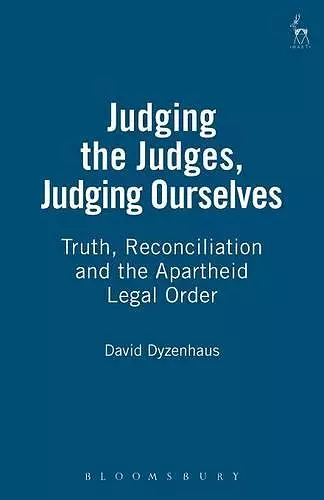Judging the Judges, Judging Ourselves
Truth, Reconciliation and the Apartheid Legal Order
Format:Paperback
Publisher:Bloomsbury Publishing PLC
Published:20th Oct '03
Currently unavailable, and unfortunately no date known when it will be back

With a Foreword by the South African Minister of Water Affairs and Forestry, Kader Asmal. The Truth and Reconciliation Commission (TRC), established in South Africa after the collapse of apartheid, was the bold creation of a people committed to the task of rebuilding of a nation and establishing a society founded upon justice, equality and respect for the rule of law. As part of its historic, cathartic, mission, the TRC held a special hearing, calling to account the lawyers - judges, academics and members of the bar -who had been crucial participants in the apartheid legal order. This book is an account of those hearings, and an attempt to evaluate, in the light of theories of adjudication, the historical role of the judiciary and bar in the apartheid years. This book offers us the spectacle of an entire legal system on trial. The echoes from this process are captured here in a way which will appeal to all readers, lawyers and non-lawyers alike, interested in the relationship between law and justice, as it is exposed during a period of transition to democracy. "...an excellent commentary on a crucial period...a clear, concise and thorough analysis...This book should be required reading for anyone with a concern for the relationship between law and justice. .." -Paul Williams (Journal of Modern African Studies) "a sustained reflection on questions of complicity, on the politics of the Rule of Law, and on the relation between law and justice. It presents a forceful case for an 'inner morality' not just of law, but of the citizenry's attitude towards that law". -Scott Veitch (Res Publica) "The Truth and Reconciliation Hearings, as rendered in Professor Dyzenhaus' book, capture the misery and suffering of a nation. Sometimes almost unbearable to read, it is a fascinating account of the human dimensions of law's effect...the book is as much about hope as it is about pain. Judging the Judges, Judging Ourselves is singularly effective in combining a scholarly dissection of legal issues with an underlying, passionate quest for justice. To this reader at least, it was a page-turner" -Vivian Grosswald Curran (Alberta Law Review) "...an excellent book for at least three reasons. First, it is a critically engaged, firsthand account of a unique legal and political event...Second,...
Through his close scrutiny of the Legal Hearing of the South African Truth and Reconciliation Commission, Dyzenhaus renders notable service as an historian and philosopher of law. His book becomes an intentional part of the work of the tribunal and an enduring part of the archive in the 'struggle against forgetting' (p.182). His admonitions and arguments about law help us to understand possibilities and pitfalls of the ongoing work of democratic law in all societies. Peter d'Errico The Law and Politics Book Review June 2004 ...provides an excellent commentary on a crucial period of the TRC's investigations designed to highlight the unavoidable connections between philosophy, law and politics...a clear, concise and thorough analysis...This book should be required reading for anyone with a concern for the relationship between law and justice as well as those with a specific interest in the particularities of the South African transition. Paul Williams Journal of Modern African Studies June 2002 The Truth and Reconciliation Hearings, as rendered in Professor Dyzenhaus book, capture the misery and suffering of nation. Sometimes almost unbearable to read, it is a fascinating account of the human dimensions of laws effect, an illustration of Robert Covers thesis that law does not merely perpetrate and depend on violence, but that it is violence. Professor Dyzenhaus argues that law also can offer the promise of justice. In this respect, the book is as much about hope as it is about painJudging the Judges, Judging Ourselves is singularly effective in combining a scholarly dissection of legal issues with an underlying, passionate quest for justice. To this reader at least, it was a page-tuner, as the author alternated among legal theory, argument and testimony. In the context of the voices of the dispossessed, quoted word for word, no doubt can remain as to why the questions this book poses are vital, or as to whether we need be concerned with trying to formulate and articulate the theoretical underpinnings of judicial systems and the appropriate conduct of judges. Vivian Grosswald Curran Alberta Law Review September 2002 Judging the Judges, Judging ourselves is an excellent book for at least three reasons. First, it is a critically engaged, firsthand account of a unique legal and political event: the inquiry by South Africa's Truth and Reconciliation Commission into the operation of that country's legal system under Apartheid. Second, it develops an extended argument for a challengingly normative conception of the rule of law, complete with compelling practical illustrations of what can happen if officials charged with maintaining the integrity of a legal system adopt a less substantive standard. And third, the book is well written and a pleasure to read. Michael Milde Canadian Journal of Law and Jurisprudence September 2002 ...a sustained reflection on questions of complicity, on the politics of the Rule of Law, and on the relation between law and justice. In the argument's unfolding it comes to be a challenge not only to South African lawyers' self-understanding of their past roles and present and future commitments, but also to lawyers and western legal systems more generally. It presents a forceful case for an 'inner morality' not just of law, but of the citizenry's attitude towards that law. Scott Veitch Res Publica September 2002 ...the author subjects to sustained critical analysis fundamental concepts, such as judicial independence, parliamentary sovereignty and the rule of law, which go to the very heart of the judicial functionThis is a splendid book. The Hon Sir Anthony Mason Law Society Journal September 2002
ISBN: 9781841134031
Dimensions: 216mm x 138mm x 11mm
Weight: unknown
216 pages